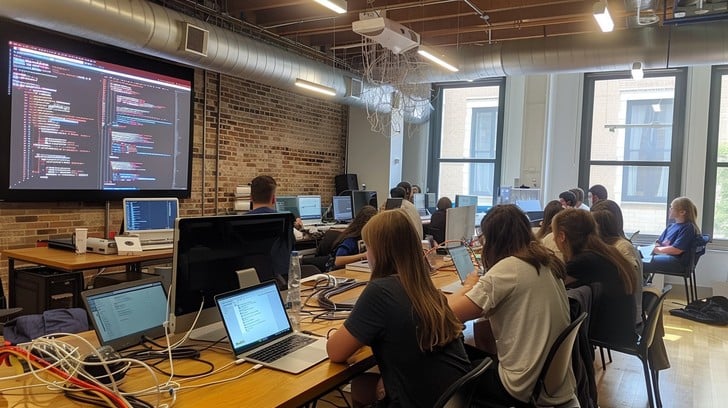Introduction
When Mark Jensen, the operations director at a mid-sized manufacturing company in Ohio, faced repeated system outages and workflow inefficiencies that were costing his company thousands of dollars weekly, he felt trapped in a technological nightmare. “We had cobbled together various systems over the years, and nothing worked together properly,” Mark recalls. After months of frustration, his company partnered with Columbus Technologies, a local IT solutions provider. Within three months, their operations were streamlined with integrated systems that communicated seamlessly, productivity soared, and downtime became a distant memory.
This transformation is just one example of how Columbus Technologies is helping businesses across various sectors overcome technical challenges and embrace digital innovation. Based in Ohio, this dynamic technology company has established itself as a trusted partner for organizations looking to navigate the increasingly complex digital landscape. Through a comprehensive suite of services ranging from custom software development to strategic IT consulting, Columbus Technologies is enabling businesses to not just survive but thrive in today’s technology-driven marketplace.
The Technology Solutions Industry: Background and Trends
The technology solutions sector has undergone remarkable transformation over the past decade, evolving from basic IT support services to comprehensive digital transformation partnerships. This shift reflects the changing needs of businesses as technology becomes increasingly central to operations across all industries.
According to recent market research, the global IT services market reached a valuation of $1.3 trillion in 2024 and is projected to grow at a compound annual growth rate (CAGR) of 8.2% through 2030. This growth is driven by several factors:
- Increasing demand for digital transformation across industries
- The proliferation of cloud computing and software-as-a-service (SaaS) models
- Growing cybersecurity concerns and compliance requirements
- The rise of artificial intelligence and automation technologies
- Expanding need for data analytics and business intelligence solutions
Within this landscape, regional technology solution providers like Columbus Technologies play a crucial role in helping local and mid-sized businesses access enterprise-level technology solutions tailored to their specific needs and budgets. These companies typically offer a blend of services that larger national providers might not customize for smaller clients.
The COVID-19 pandemic accelerated many of these trends, with businesses of all sizes rapidly adopting remote work solutions, cloud services, and digital collaboration tools. This acceleration has continued into 2024-2025, with a particular emphasis on cybersecurity, AI integration, and creating resilient IT infrastructures that can support hybrid work models.
Key Services and Solutions from Columbus Technologies
Digital Transformation Consulting
At the core of Columbus Technologies’ offerings is their comprehensive digital transformation consulting service. This approach helps businesses evaluate their current technological landscape and develop strategic roadmaps for evolution.
Their process typically begins with a thorough assessment of the client’s existing systems, workflows, and pain points. From there, Columbus Technologies consultants work closely with business stakeholders to develop prioritized transformation plans that align with business objectives while respecting budgetary constraints.
What sets their consulting approach apart is the emphasis on practical, implementable solutions rather than theoretical frameworks. As Steve Hickenbottom, a key principal at Columbus Technologies, often states, “Our success is measured by our clients’ successful implementation, not by the impressiveness of our PowerPoint presentations.”
Custom Software Development
Recognizing that off-the-shelf solutions don’t always address the unique needs of businesses, Columbus Technologies offers custom software development services that create tailored applications designed specifically for their clients’ workflows and challenges.
Their development team utilizes modern methodologies including Agile and DevOps practices, ensuring rapid development cycles with frequent stakeholder feedback. This approach minimizes the risk of project scope creep while ensuring the final product truly meets business needs.
Recent projects have included:
- Inventory management systems integrated with IoT sensors
- Customer relationship management (CRM) platforms customized for specific industries
- Workflow automation tools that bridge gaps between disparate systems
- Mobile applications that extend business capabilities to field workers

Cloud Migration and Management
As businesses increasingly move away from on-premises infrastructure to cloud-based solutions, Columbus Technologies has positioned itself as a trusted guide through this often complex transition. Their cloud services include:
- Assessment of current infrastructure and applications for cloud readiness
- Development of strategic migration plans with minimal business disruption
- Implementation of hybrid cloud solutions where appropriate
- Ongoing cloud optimization and management
- Security and compliance monitoring for cloud environments
Their partnership approach is particularly valuable for organizations with limited internal IT resources, as Columbus Technologies provides both the technical expertise and project management capabilities needed for successful cloud transitions.
Cybersecurity Solutions
In an era of increasing digital threats, Columbus Technologies’ cybersecurity offerings have become one of their fastest-growing service areas. Their comprehensive approach combines technological solutions with policy development and employee training.
Key components of their cybersecurity services include:
- Vulnerability assessments and penetration testing
- Implementation of multi-layered security architectures
- Security monitoring and incident response planning
- Compliance guidance for industry-specific regulations
- Employee security awareness training programs
By taking this holistic approach to security, Columbus Technologies helps clients develop resilient security postures that protect critical assets while enabling business operations to continue smoothly.

Real-Life Applications
For Small and Medium Businesses
For small and medium-sized businesses (SMBs), access to enterprise-level technology expertise can be transformative. Columbus Technologies has developed specialized service packages that make advanced technology solutions accessible to companies with more limited IT budgets.
One success story involves a local retail chain that struggled with outdated point-of-sale systems and inventory management. Working with Columbus Technologies, they implemented an integrated solution that:
- Connected in-store and online sales channels
- Automated inventory replenishment
- Provided real-time analytics on sales performance
- Enabled personalized marketing based on customer purchase history
This digital transformation resulted in a 22% increase in sales within the first year while reducing inventory costs by 15%, demonstrating how technology investments can directly impact business performance for SMBs.
For Healthcare Organizations
The healthcare sector faces unique challenges related to patient data privacy, regulatory compliance, and the need for seamless information sharing across care teams. Columbus Technologies has developed specialized expertise in this sector, helping healthcare providers leverage technology to improve both operational efficiency and patient care.
Their healthcare solutions typically focus on:
- Electronic health record (EHR) system integration and optimization
- Secure telemedicine platforms for remote patient care
- Data analytics for population health management
- HIPAA-compliant cloud storage and communication systems
- Medical device integration and monitoring
A notable case involved a multi-location medical practice that partnered with Columbus Technologies to implement a comprehensive practice management solution. This system streamlined scheduling, billing, and patient communications while ensuring strict compliance with healthcare regulations. The result was a 30% reduction in administrative overhead and significantly improved patient satisfaction scores.
For Manufacturing and Industrial Clients
The manufacturing sector is undergoing its own digital revolution, often referred to as Industry 4.0. Columbus Technologies works with manufacturing clients to implement technologies that increase production efficiency, reduce downtime, and provide greater visibility into operations.
Key manufacturing solutions include:
- IoT sensor networks for equipment monitoring
- Predictive maintenance systems that anticipate equipment failures
- Production floor automation and robotics integration
- Supply chain visibility and management tools
- Quality control systems with machine vision capabilities
One manufacturing client reported that after implementing Columbus Technologies’ predictive maintenance solution, they experienced a 45% reduction in unplanned downtime and extended the useful life of their equipment by an average of 3 years—demonstrating the significant ROI potential of well-implemented technology solutions in industrial settings.
For Government and Public Sector
Public sector organizations often face unique challenges related to transparency, public access to information, and strict procurement regulations. Columbus Technologies has developed expertise in navigating these requirements while delivering modern technology solutions to government clients.
Their public sector offerings include:
- Citizen-facing portals and service platforms
- Document management and public records systems
- Secure internal communication and collaboration tools
- Data integration across departmental systems
- Grant management and compliance reporting solutions
By helping government agencies modernize their technology infrastructure, Columbus Technologies contributes to more efficient public services and better citizen experiences when interacting with government organizations.
Future Outlook
As we look toward the future of technology solutions, several key trends are likely to shape how companies like Columbus Technologies evolve their service offerings and help clients navigate the changing technological landscape.
AI and Automation Integration
Artificial intelligence and automation technologies are rapidly moving from experimental to essential in business operations. Over the next 3-5 years, Columbus Technologies is likely to expand its AI implementation services, helping clients:
- Automate routine business processes to increase efficiency
- Implement predictive analytics for better decision-making
- Develop customer-facing AI applications like chatbots and recommendation engines
- Create intelligent document processing systems that extract meaningful data from unstructured information
- Deploy computer vision systems for quality control and security applications
The practical application of AI to solve specific business problems, rather than implementing technology for its own sake, will be the focus of these efforts.
Edge Computing Expansion
As IoT devices proliferate and the volume of generated data increases exponentially, edge computing—processing data closer to where it’s created rather than in centralized cloud environments—will become increasingly important. Columbus Technologies is positioned to help clients:
- Design and implement edge computing architectures
- Develop strategies for managing distributed computing resources
- Create systems that balance local processing with cloud integration
- Implement security measures specific to edge environments
- Optimize networks to support edge computing requirements
This trend will be particularly important for manufacturing, healthcare, and retail clients who need real-time data processing capabilities.
Cybersecurity Evolution
As digital threats continue to evolve in sophistication, cybersecurity will remain a critical focus area. Future developments in Columbus Technologies’ security offerings will likely include:
- Zero-trust architecture implementations
- Advanced threat hunting and intelligence services
- AI-powered security monitoring and response
- Expanded security training and awareness programs
- Supply chain security assessments and monitoring
The integration of security considerations throughout all technology implementations, rather than as a separate consideration, will become standard practice.
Sustainability-Focused Technology
Environmental considerations are increasingly influencing technology decisions, and Columbus Technologies is likely to incorporate sustainability into its consulting and implementation practices. This might include:
- Energy-efficient infrastructure design and cloud optimization
- Tools for measuring and reporting on technology-related carbon footprints
- Circular economy considerations in hardware procurement and disposal
- Remote work technologies that reduce commuting requirements
- Smart building systems that optimize energy usage
These sustainability-focused offerings will help clients meet both environmental goals and potential regulatory requirements while often reducing operational costs.
Challenges and Limitations
Despite the promising outlook, several challenges and limitations may impact how technology solution providers like Columbus Technologies operate and deliver value to clients.
Talent Acquisition and Retention
The technology sector continues to face significant talent shortages, particularly in specialized areas like cybersecurity, AI development, and cloud architecture. For regional providers like Columbus Technologies, competing with larger national firms and technology giants for skilled professionals presents an ongoing challenge.
Potential strategies to address this include:
- Developing partnerships with local educational institutions
- Creating robust internship and apprenticeship programs
- Implementing flexible work arrangements to attract talent from broader geographic areas
- Focusing on workplace culture and professional development opportunities
- Leveraging contractor networks for specialized project needs
Rapid Technological Change
The pace of technological innovation continues to accelerate, creating challenges for solution providers who must continuously update their expertise and service offerings. Areas that were cutting-edge just a few years ago can quickly become standard or even obsolete.
To navigate this challenge, Columbus Technologies and similar providers must:
- Invest in continuous learning programs for their teams
- Develop strong partnerships with technology vendors
- Create modular solution architectures that can adapt to changing technologies
- Balance innovation with proven, stable technologies for critical systems
- Establish clear technology evaluation and adoption frameworks
Security and Compliance Complexity
As regulatory requirements around data protection, privacy, and security continue to evolve, technology solution providers face increasing complexity in ensuring client implementations meet all applicable standards. This is particularly challenging when working across multiple industries, each with their own regulatory frameworks.
Addressing this challenge requires:
- Developing specialized expertise in key regulatory areas
- Creating compliance-by-design frameworks for solution development
- Implementing rigorous security testing and validation processes
- Staying current with evolving regulatory requirements
- Building partnerships with legal and compliance experts
Cost Pressures and ROI Expectations
As technology becomes increasingly central to business operations, organizations are investing more in these areas but also expecting clearer returns on their investments. Technology solution providers must demonstrate not just technical capability but also business value.
This challenge necessitates:
- Developing robust ROI calculation methodologies
- Creating phased implementation approaches that deliver incremental value
- Focusing on business outcomes rather than technical specifications
- Implementing clear metrics and reporting on value realization
- Balancing innovation with cost-effectiveness
Conclusion
In a world where technology is no longer just a support function but a core business driver, companies like Columbus Technologies play a vital role in helping organizations navigate the complex digital landscape. Through their comprehensive service offerings spanning consulting, custom development, cloud services, and cybersecurity, they enable businesses of all sizes to leverage technology effectively.
The success stories of companies like the manufacturing firm from our introduction highlight how the right technology partner can transform business operations, enhance productivity, and create competitive advantages. As we look to the future, the integration of AI, edge computing, enhanced security, and sustainability considerations will continue to reshape how technology solutions are developed and implemented.
For businesses looking to thrive in this increasingly digital world, finding the right technology partner—one that combines technical expertise with business acumen and a commitment to client success—will remain essential. Columbus Technologies exemplifies this type of partner, focused not just on implementing technology but on delivering meaningful business outcomes through thoughtful digital solutions.
Share your thoughts in the comments about how technology solutions have impacted your business, or subscribe to our newsletter for more insights on navigating the evolving digital landscape.
Also read: [Choosing the Right IT Partner: A Guide for Business Leaders]
Frequently Asked Questions
What services does Columbus Technologies offer for businesses looking to modernize their IT infrastructure?
Columbus Technologies offers a comprehensive suite of services designed to help businesses modernize their IT infrastructure while minimizing disruption to ongoing operations. Their approach typically begins with a thorough assessment of current systems, identifying opportunities for improvement and potential risks. Based on this assessment, they develop a strategic roadmap that may include cloud migration, network modernization, security enhancements, and application updates or replacements. What distinguishes Columbus Technologies from many providers is their emphasis on business continuity throughout the modernization process. They implement changes in carefully planned phases, ensuring critical systems remain operational while improvements are made. Additionally, they provide comprehensive training and change management support to help employees adapt to new systems efficiently. Whether you’re looking to move from legacy systems to cloud-based solutions, enhance security posture, or improve system integration, Columbus Technologies can develop a customized modernization strategy aligned with your business objectives and budget constraints.
How does Columbus Technologies approach cybersecurity for small and medium-sized businesses?
Columbus Technologies recognizes that small and medium-sized businesses face many of the same cybersecurity threats as larger enterprises but often with more limited resources. Their approach to SMB cybersecurity focuses on delivering enterprise-grade protection through right-sized, cost-effective solutions. They typically begin with a comprehensive risk assessment to identify the most critical vulnerabilities specific to your business and industry. Based on this assessment, they implement a multi-layered security strategy that might include advanced endpoint protection, network security monitoring, email security solutions, and data backup systems. Columbus Technologies places particular emphasis on employee security awareness training, recognizing that human error remains one of the biggest security vulnerabilities for most organizations. Their managed security services provide ongoing monitoring and threat response, giving SMBs access to security expertise without requiring a full in-house security team. This approach allows smaller businesses to achieve robust cybersecurity postures that align with industry standards and regulatory requirements while working within realistic budget constraints.
What industries does Columbus Technologies primarily serve, and how do they tailor their solutions for different sectors?
While Columbus Technologies serves clients across many industries, they have developed particular expertise in healthcare, manufacturing, professional services, and the public sector. Their industry-specific approach involves not just understanding technical requirements but also the unique business challenges, regulatory considerations, and competitive dynamics of each sector. For healthcare clients, they focus on solutions that maintain strict HIPAA compliance while improving patient care coordination and operational efficiency. In manufacturing, their solutions often center on production floor automation, supply chain visibility, and predictive maintenance systems. For professional services firms, they emphasize secure collaboration tools, client management systems, and business analytics. Public sector solutions typically address transparency requirements, citizen service delivery, and cross-departmental information sharing. What makes Columbus Technologies effective across these diverse industries is their consultative approach—they begin each engagement by deeply understanding the specific business context and challenges before recommending technology solutions. This ensures that implementations address the real needs of each industry rather than applying one-size-fits-all technology approaches.
How does Columbus Technologies help businesses implement artificial intelligence and automation solutions?
Columbus Technologies takes a practical, results-focused approach to AI and automation implementation, helping businesses move beyond the hype to achieve tangible benefits. Their process typically begins with identifying specific business processes that could benefit most from automation or AI enhancement, prioritizing opportunities based on potential ROI and implementation complexity. Rather than pursuing cutting-edge AI for its own sake, they focus on proven applications like document processing automation, predictive analytics, customer service automation, and decision support systems. Their implementation methodology emphasizes starting with smaller, high-impact projects to demonstrate value before expanding to more complex applications. Columbus Technologies also recognizes that successful AI implementation requires more than just technology—it needs data governance, process redesign, and change management. They provide comprehensive support in these areas, helping clients build the foundational capabilities needed for AI success. Additionally, they emphasize ethical AI considerations and transparency in automated decision-making, ensuring implementations align with both regulatory requirements and organizational values.
What support and maintenance services does Columbus Technologies provide after implementing new systems or solutions?
Columbus Technologies understands that implementing new technology is just the beginning of the journey—ongoing support and evolution are essential for long-term success. Their post-implementation services are designed to ensure clients continue to receive value from their technology investments while adapting to changing business needs. Their support offerings typically include multiple tiers, from basic break/fix services to comprehensive managed services where they take responsibility for the ongoing performance, security, and optimization of implemented systems. For critical systems, they provide 24/7 monitoring and response capabilities, ensuring issues are identified and addressed before they impact business operations. Beyond reactive support, Columbus Technologies also offers proactive maintenance services, including regular system health checks, performance optimization, security patching, and capacity planning. Many clients opt for their quarterly technology review service, where technical specialists and business consultants evaluate how well current systems are meeting business needs and identify opportunities for improvement. This ongoing partnership approach ensures that technology solutions continue to evolve with client businesses rather than becoming obsolete or misaligned with objectives over time.

